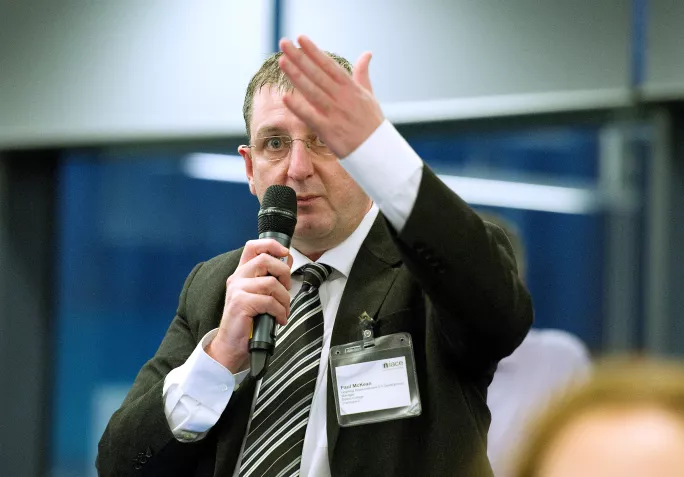- Home
- Meet the edtech champion who was saved by college
Meet the edtech champion who was saved by college

“One thing I’m pretty good at is staying the course with things,” says Paul McKean.
“Pretty good” is quite the understatement.
McKean has not had it easy. Today, he is known by many in the further education sector as Jisc’s head of FE and skills. Many of the leaders in further education have had bumpy and varied journeys to the top jobs, but McKean’s is particularly striking. It’s a story that not only demonstrates the life-saving power of the FE sector, but also McKean’s strength and determination.
News: College cyberattacks on the rise
Opinion: FE sector ‘underinvesting in cybersecurity’
Background: Do colleges still need Jisc?
McKean was born in Crewe, Cheshire, where he lived with his parents and three sisters. When he was 13, his parents got divorced. He says he was a good student at school - “I certainly wasn’t a rebel” - but wasn’t particularly academic. Aged 16, he stayed on at the school’s sixth form to study A levels.
However, the two years of study resulted in an unexpected outcome, as McKean was involved in an accident in which he knocked someone down while driving.
“I wasn’t guilty of anything apart from the misfortune of this person happening to run in front of the car but it had quite an effect on me. It wasn’t long after I’d passed my test and it was a bit of a situation,” he says.
“I didn’t lose an interest in education, but it was very difficult because obviously that’s quite an emotional thing to go through. It took my whole concentration over everything else really. It was to the detriment of my studies.”
McKean didn’t walk away from education. But he knew that his A-level results weren’t going to be good enough to get him into university, and instead looked for a job. The day after leaving college, McKean became a door-to-door salesman.
“It was extremely character building. When you’re knocking on the doors, you get lots and lots of ‘nos’. It really does make you resilient. It’s something I would recommend to many of the young people of today to realise that you don’t get everything at the first time of asking. You have to persevere,” he says.
McKean was a salesman for two to three years, and a successful one at that: it enabled him to move out of home and buy his own house.

An uncertain future
Then, at the age of 20, everything changed. McKean started to experience agonising back pain, which was diagnosed as being caused by degenerative disc disease. This was the start of eight years in and out of hospital and multiple operations, which left him walking with sticks.
McKean underwent multiple laminectomy, discectomy and lumbar manipulation operations during his twenties. The doctors hoped that his skin would heal quickly. But it was the scar tissue which caused severe problems: it hardened and put immense pressure on his spine.
McKean was unable to work. He had to sell his house, move into a small flat and rely on social care to look after him. He was forced to wait years for the operations he needed to live a normal life. Unable to move around without help, McKean lived much of his life in isolation.
“I had to survive off the care of the traditional social services people that would come in and do meals and things like that. Trust me, at twenty-odd, when you get people come and cook for you, and to look after you in that way, it’s not a very positive thing to be in receipt of,” he says.
“When I’ve reflected, I definitely had mental health issues at that time. You can’t see what your future is holding because, simply, you know it’s the same day one after another. Having gone through unsuccessful surgery, you don’t see a light at the end of the tunnel.”
Appropriately, given his current role, it was technology that saved McKean. A surgeon recommended he had laser surgery to get rid of the hardened scar tissue that put so much pressure on his back. The operation was excruciatingly painful: McKean had to be awake throughout.
The memory has never left him: “You’re wide awake when they have the operation and they’ve literally got the laser in your back. Although many people, including my wonderful fiancée, say there’s no pain like childbirth, I would argue that maybe there is,” he says.
Painful, but successful. The operation gave McKean his life back and left him with a sense of awe about the impact that technology can have.
He’d always been interested in computers as a child, and says he spent hours in his bedroom coding. While he was recovering from his laser surgery, he heard an advert on the radio for a BBC Bitesize course, “Computers Don’t Bite”. Determined to rebuild his life, he applied.
The discovery of further education
The two-hour basic computer skills course sparked his interest. Further courses followed, and then McKean bought himself a computer. After a few months of scrolling the internet and teaching himself at home, he applied to an IT course at Bolton College.
At Bolton, he excelled. So much so that the staff recognised his potential and asked him to help other members of the class. A few years later and McKean was still at Bolton, helping other learners gain crucial IT skills.
“People started to say to me, ‘You know you’ve got an aptitude towards teaching. We need people who can teach, is this something you’re interested in?’” he says.
McKean was accepted on to PGCE at Bolton, but despite spending years supporting other learners, he couldn’t recognise his natural ability.
“In the first session, the leader said, ‘Imagine this room’s a swimming pool and those of you who know why you’re here and why you want to teach, you move down to the deep end. Those of you who feel a bit unsure, you move to the middle. And that those of you with no idea why you’re here, move to the shallow end.’
“I was the only one in the shallow end. I felt completely out of my depth. Did I see myself doing this for a living? I just didn’t. All the other people had aspirations to be a teacher, but for me, it was purely my ability to support people rather than teach. It made me think, right OK, I shouldn’t be here,” he says.
But he’s not one to give up and by the end of the year, he was the only member of the class who went on to become a teacher.
“From the first day of teaching and having that ability to impart not just knowledge and skills but confidence, I just loved it. I could relate to the students: I reengaged with FE through this advert that was on the radio. It was still a big step for me to go over that threshold into the unknown and many of my students were in that same boat,” he says.
As well as teaching multimedia at Bolton, McKean led a number of community technology projects, helping people like himself who had been ill, who had been carers, who hadn’t engaged in school, gain basic computer skills. He worked for Bolton Council developing a long-term ICT strategy for its adult community learning provision before moving back to Bolton College as an advanced practitioner to do the same at the institution that had done so much for him.

Life at Jisc
When McKean felt that he had done all he could to help the staff and students at Bolton, he moved to Jisc to run the not-for-profit technology company’s regional support centre.
Nine months into his role, Jisc restructured with the aim of becoming more strategic. Having written technology strategies for both a council and college, McKean was the obvious choice to do so for Jisc, and the role of head of FE and skills was born.
It’s not been plain sailing in McKean’s four years in the role. He’s seen the company change to a subscription model due to funding, and dealt with the sector’s reaction to that.
“The fact that 100 per cent of colleges have signed up to us is not an endorsement of paying - we know the financial position of colleges - but a recognition of what we do. To go elsewhere would cost colleges more, and they wouldn’t get the real quality of provision around the connectivity and certainly the cybersecurity that we offer,” he says.
McKean is clear: Jisc is there to help colleges tackle any issues they may face, not to sell them edtech products.
“It’s a really odd statement to make but at Jisc, we don’t talk about technology, it’s not about the technology. We need to understand the particular problems or issues and concerns that an organisation has.
“It’s about understanding what it is that the college is trying to achieve, for example reducing teacher workload, and if there’s a technological solution that can enable that. It’s not about selling this, that and magic,” he says.
The workload burden teachers face is something McKean sees both at work and at home.
“I live with a primary school teacher and she’s working till 11 o’clock every night and goes into school at seven in the morning. She works many more hours than I do because of the bureaucracy burden that is put on her.
“I can see there’s absolutely a role in technology to reduce that. Ultimately, there isn’t a million answers, it can just be two or three things which can make a massive difference, not just to their work but their life,” he says.
McKean recognises that when it comes to technology in education, some are terrified of robots coming in and stealing their jobs. But actually, he says, the digital world hasn’t “dynamically changed” the education sector yet. He cites Blockbuster vs Netflix, Kodak vs Instagram, Amazon vs the high street.
“In the next five to 10 years, technology is going to have to change the sector for the wellbeing of the staff, for the skills, knowledge and behaviours that the learners are going to need in the workplace. The kind of jobs that the FE sector is training people to do are going to be, or are already, being disrupted by digital. Disruption is probably an unfortunate word because it sounds like, you know, a mess. But it’s an opportunity,” he says.
“Within Jisc, we have a role to really get college leaders and policymakers to understand the real opportunity that digital provides to get a better learning experience for the learners, a better working experience for the staff in college and to get a better performing workforce.
“I think that there’s a lot more challenges ahead and I’d be quite happy to be here, leading the way.”
Paul McKean is giving a talk ‘Education 4.0 and Industry 4.0: what it means for FE and skills’ at Jisc’s edtech event, Digifest 2020. Taking place at Birmingham ICC on Tuesday 10 and Wednesday 11 March, Digifest 2020 is free for staff, students and researchers at Jisc member colleges and universities
Keep reading for just £1 per month
You've reached your limit of free articles this month. Subscribe for £1 per month for three months and get:
- Unlimited access to all Tes magazine content
- Exclusive subscriber-only stories
- Award-winning email newsletters



